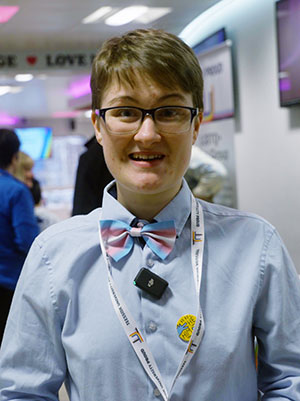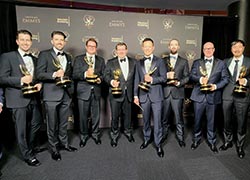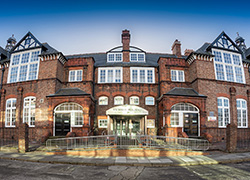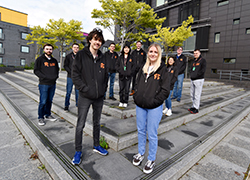Course overview
Foundation year Work placement
Animex 2024
Animex 2024 round-up, our international festival of animation, VFX and games.
The games designer makes great ideas become real, designing the rules and structure of a game, and implementing them in a game engine. It involves working with many different people, understanding the roles of specialists who need to work together to create games. You develop 2D and 3D design skills alongside an appreciation of game mechanics and its relationship to game play, including conceptual, story, character, level and visual design. You also study game engines and industry technologies and compare their capabilities.
Top reasons to study this course at Teesside:
- Industry links: take part in Animex, our annual international animation and games festival featuring experts from Rockstar, Pixar, Disney and Sony.
- Real-world experience: enter GameJam events, take part in industry competitions and Beta test upcoming games before they are released.
- Career-ready: our ExpoSeries of events allow you to showcase your skills to industry professionals who are seeking to recruit new and rising talent.
- Scholarships: you could be eligible for a £9,000 scholarship to support your studies (excluding those applying to the foundation year).
- Quality teaching: 92.4% of computer games and animation students agreed that staff often made the subject engaging (National Student Survey 2024, tees.ac.uk/source).
Course details
Course structure
Year 1 core modules
Gain the skills you need for game creation using a contemporary game engine. Understand the fundamentals of modern game development, including scripting, asset creation and level design.
This is a 30-credit module.
You learn the core theories involved in designing games. Examine the pre-production stages, focusing on the role of mechanics in designing an engaging and immersive gaming experience.
This is a 30-credit module.
Study the fundamental concepts involved in creating game prototypes. Examine core gameplay loops, focusing on interaction and how this creates a tactile and engaging experience.
This is a 30-credit module.
You work on an individual artefact related to a game experience using a brief set by industry. Develop your experience of working with a real production brief, targeting specific production skills within your own field of study.
This is a 30-credit module.
Year 2 core modules
Games Business, Marketing and Publishing
You focus on the business, marketing and publishing aspects of the games industry, examining new trends and business models for games development. Look at the process for turning a digital concept into an attractive business proposal to acquire funding and investment, and explore how marketing, publishing and distribution get a game to market.
This is a 30-credit module.
You work with students from across all the games courses to develop a game slice in a team. Experience working in a production environment, and focus on specific skills in your own field of study while gaining valuable teamwork skills.
This is a 30-credit module.
Explore the design and production of gameplay missions, why people play games, what makes them fun and how you can apply this knowledge to add depth and playability to level design.
This is a 30-credit module.
You look at the processes for developing frontend and heads-up display interfaces and user experiences for games. Explore design theories, interactivity, accessibility, rational navigation and interface psychology.
This is a 120-credit module.
Optional work placement year
You have the option to spend one year in industry learning and developing your skills. We encourage and support you with applying for a placement, job hunting and networking.
You gain experience favoured by graduate recruiters and develop your technical skillset. You also obtain the transferable skills required in any professional environment, including communication, negotiation, teamwork, leadership, organisation, confidence, self-reliance, problem-solving, being able to work under pressure, and commercial awareness.
Many employers view a placement as a year-long interview, therefore placements are increasingly becoming an essential part of an organisation's pre-selection strategy in their graduate recruitment process. Benefits include:
· improved job prospects
· enhanced employment skills and improved career progression opportunities
· a higher starting salary than your full-time counterparts
· a better degree classification
· a richer CV
· a year's salary before completing your degree
· experience of workplace culture
· the opportunity to design and base your final-year project within a working environment.
If you are unable to secure a work placement with an employer, then you simply continue on a course without the work placement.
Final-year core modules
Experience working as a member of a games development team, in a setup that is as close to industrial practice as possible. You work in groups to construct a working game demo in a current game engine. You consider standard industry practices that consider multiplayer gaming threats, user safety, cheating and data security.
This is a 30-credit module.
You undertake a large-scale project guided by a member of staff, where you produce a substantial piece of work related to your course alongside a written report. You also present and discuss your project.
This is a 60-credit module.
Narrative Design and Integration
Explore the theory and integration of games narrative concepts. Investigate elements of storytelling including narration, character creation, story arcs, point of view, voice, tense, cutscene, narrative wash and texture, backstory, storytelling using affordances and signifiers, world building, emergent storytelling, and found text and audio.
This is a 30-credit module.
Modules offered may vary.
How you learn
For each module you learn in a series of lectures and tutorials. Lectures provide you with specific theoretical information related to the subject while the tutorials focus on developing your practical skills. In the later tutorials you work on assessments and use this time to get feedback and advice from tutors. Further support is offered online in the form of extra learning material. You are expected to manage your time to complete work outside the tutorial sessions.
In your second year you take part in our unique Journeyman module, highly praised by industry, in which all games design students work with games artists, programmers and animators in a simulated game studio experience, outsourcing various essentials such as assets and animation to specialist teams. You work on games in Unreal and Unity to strict milestones in a scenario that is as close to industry practice as possible within an academic environment.
Learn using our industry-standard facilities including multiple games development labs, virtual reality lab, and state-of-art motion capture facilities.
How you are assessed
We believe that it is essential for you to learn through the experience of doing. Assessment for all modules is in the form of practical projects, which you work on throughout the year. You develop a portfolio of design work throughout the course. In Year 2, the Journeyman module provides you with essential teamwork skills ready for industry. The final year project allows you the freedom to set your own project based on your skills and interests.
Our Disability Services team provide an inclusive and empowering learning environment and have specialist staff to support disabled students access any additional tailored resources needed. If you have a specific learning difficulty, mental health condition, autism, sensory impairment, chronic health condition or any other disability please contact a Disability Services as early as possible.
Find out more about our disability services
Find out more about financial support
Find out more about our course related costs
Entry requirements
Entry requirements
96-112 points
Find out how many points your qualifications are worth using the UCAS tariff calculator. If your qualifications are not listed, contact our admissions team as we may accept alternatives.
We may also be able to help you meet the entry requirements through our Summer and Winter University modules.
For general information please see our overview of entry requirements.
International applicants can find out what qualifications they need by visiting Your Country.
You can gain considerable knowledge from work, volunteering and life. Under recognition of prior learning (RPL) you may be awarded credit for this which can be credited towards the course you want to study.
Find out more about RPL
Employability
Career opportunities
This specialist degree offers the skills you need for a career in the games industry and provides generic skills which open up numerous other career paths. Some of our graduates have been recognised as being among the world's best young games development talent, and feature in Develop magazine's annual 30 under 30.
Employment opportunities include creative director, games designer, scriptwriter, level designer, interface designer and games tester.
Graduates from our games degrees have gone on to work as level designers, junior game designers, mission designers and artists in a wide range of companies including 3rd Dimensions, Double Eleven, Bizarre Creations, Creative Assembly, Eutechnyx, Halch, Media Molecule, Microsoft Rare, Naughty Dog, Ninja Theory, Frontier Rebellion, Rockstar North, Sega, Streamline, Supermassive Games, Traveller's Tales, Ubisoft, Venom, Virtual Playground, Volatile, Weta Digital and many more.
Information for international applicants
Qualifications
International applicants - find out what qualifications you need by selecting your country below.
Select your country:
Useful information
Visit our international pages for useful information for non-UK students and applicants.


 Emmy success for Teesside University graduate
Emmy success for Teesside University graduate Indie games studios to attend prestigious conference
Indie games studios to attend prestigious conference Leading games studio helping students gain industry experience
Leading games studio helping students gain industry experience